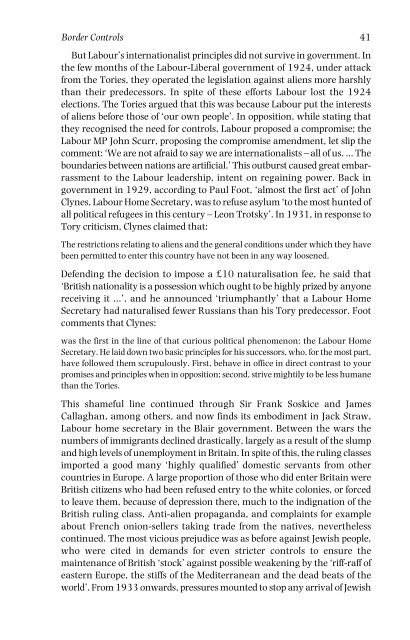Open%20borders%20The%20case%20against%20immigration%20controls%20-%20Teresa%20Hayter
Open%20borders%20The%20case%20against%20immigration%20controls%20-%20Teresa%20Hayter
Open%20borders%20The%20case%20against%20immigration%20controls%20-%20Teresa%20Hayter
Create successful ePaper yourself
Turn your PDF publications into a flip-book with our unique Google optimized e-Paper software.
Border Controls 41<br />
But Labour’s internationalist principles did not survive in government. In<br />
the few months of the Labour-Liberal government of 1924, under attack<br />
from the Tories, they operated the legislation against aliens more harshly<br />
than their predecessors. In spite of these efforts Labour lost the 1924<br />
elections. The Tories argued that this was because Labour put the interests<br />
of aliens before those of ‘our own people’. In opposition, while stating that<br />
they recognised the need for controls, Labour proposed a compromise; the<br />
Labour MP John Scurr, proposing the compromise amendment, let slip the<br />
comment: ‘We are not afraid to say we are internationalists – all of us. ... The<br />
boundaries between nations are artificial.’ This outburst caused great embarrassment<br />
to the Labour leadership, intent on regaining power. Back in<br />
government in 1929, according to Paul Foot, ‘almost the first act’ of John<br />
Clynes, Labour Home Secretary, was to refuse asylum ‘to the most hunted of<br />
all political refugees in this century – Leon Trotsky’. In 1931, in response to<br />
Tory criticism, Clynes claimed that:<br />
The restrictions relating to aliens and the general conditions under which they have<br />
been permitted to enter this country have not been in any way loosened.<br />
Defending the decision to impose a £10 naturalisation fee, he said that<br />
‘British nationality is a possession which ought to be highly prized by anyone<br />
receiving it ...’, and he announced ‘triumphantly’ that a Labour Home<br />
Secretary had naturalised fewer Russians than his Tory predecessor. Foot<br />
comments that Clynes:<br />
was the first in the line of that curious political phenomenon: the Labour Home<br />
Secretary. He laid down two basic principles for his successors, who, for the most part,<br />
have followed them scrupulously. First, behave in office in direct contrast to your<br />
promises and principles when in opposition; second, strive mightily to be less humane<br />
than the Tories.<br />
This shameful line continued through Sir Frank Soskice and James<br />
Callaghan, among others, and now finds its embodiment in Jack Straw,<br />
Labour home secretary in the Blair government. Between the wars the<br />
numbers of immigrants declined drastically, largely as a result of the slump<br />
and high levels of unemployment in Britain. In spite of this, the ruling classes<br />
imported a good many ‘highly qualified’ domestic servants from other<br />
countries in Europe. A large proportion of those who did enter Britain were<br />
British citizens who had been refused entry to the white colonies, or forced<br />
to leave them, because of depression there, much to the indignation of the<br />
British ruling class. Anti-alien propaganda, and complaints for example<br />
about French onion-sellers taking trade from the natives, nevertheless<br />
continued. The most vicious prejudice was as before against Jewish people,<br />
who were cited in demands for even stricter controls to ensure the<br />
maintenance of British ‘stock’ against possible weakening by the ‘riff-raff of<br />
eastern Europe, the stiffs of the Mediterranean and the dead beats of the<br />
world’. From 1933 onwards, pressures mounted to stop any arrival of Jewish


